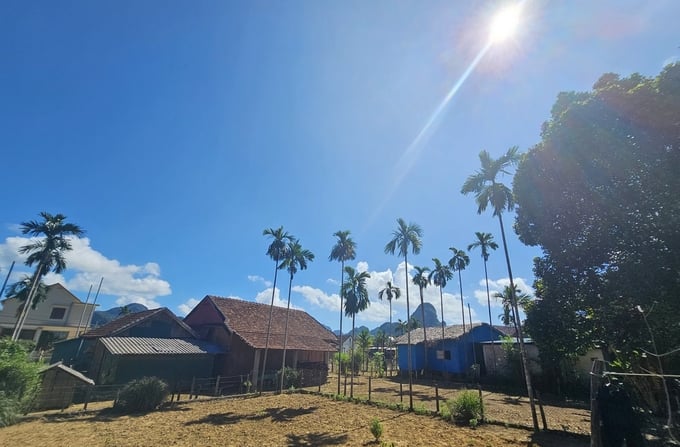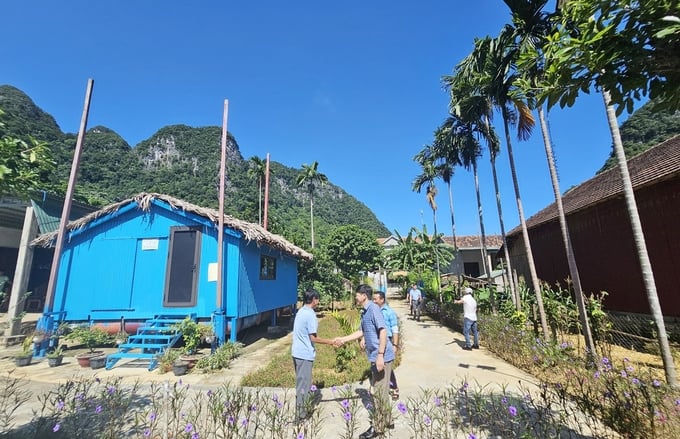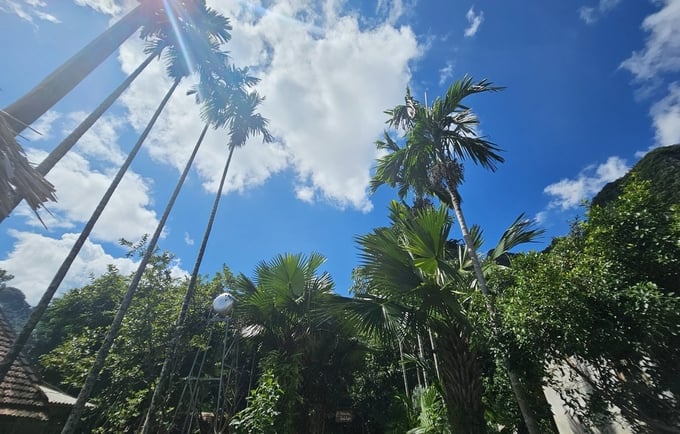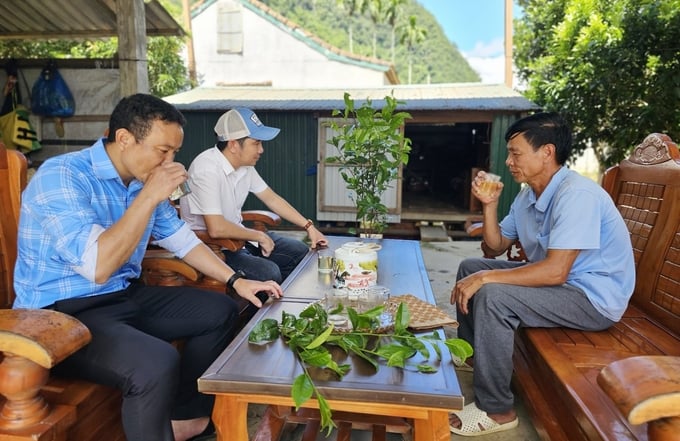June 15, 2025 | 11:57 GMT +7
June 15, 2025 | 11:57 GMT +7
Hotline: 0913.378.918
June 15, 2025 | 11:57 GMT +7
Hotline: 0913.378.918
Tan Hoa commune (Minh Hoa district), is considered the “flood zone” of Quang Binh province. During the flood season, floodwaters reach three to five meters to the houses’ roofs. At those times, Tan Hoa seems like a vast sea of water.
Local people have to live with the floods in floating houses. “Somehow, Tan Hoa people saw the potential to develop tourism. The honor of being voted ‘best in the world’ has made village people happy and proud. We will keep working together to preserve and promote this value for future generations,” Mr. Truong Thanh Duan, Chairman of Tan Hoa Commune People’s Committee said.

A vignette of Tan Hoa village today. Photo: Tam Duc.
Tan Hoa is in the middle of a valley surrounded by rolling limestone mountains. Vertical cliffs are yellowish-brown, looking like ancient city walls from a distance. Most people’s houses here are made of wooden planks, and the more luxurious houses have tiled roofs. In front of every house, there are one or two rows of areca trees planted as a gate.
Almost every house’s gable has a wooden boat guarded. Uncle Ba saw my hesitation and explained: “The flood here is very big. Every year, the flood water reaches the roof, so every family has a boat. When there is a big flood, boats can carry food, transport people, rescue people, and take them to the mountains for shelter. In years of major floods, the village had to flee to the mountains for more than ten days before returning. Lack of food, children and the elderly are hungry. Here, people rely on boats to cross that flood.”
In the early 2020s, the wooden boats gradually disappeared and were replaced by floating houses. Before, when technology was not yet developed, people used boats and rafts of wood to make pontoon houses during the flood season. Later, people bought large plastic water containers to make floats and then built huts on them so the wind and rain would not blow off the roof.

The host warmly welcomes visitors. Photo: Tam Duc.
Gradually, after struggling with big floods, people had the idea to build more sturdy floating houses, surrounded by sturdy corrugated iron walls. Mr. Truong Thanh Da (over 80 years old in Tan Hoa commune), said: “The floating house is very large and sturdy. It has been a long time since people learned how to build floating houses, but there has never been a sinking or capsizing incident. Therefore, whether the flood is big or small, people are not afraid. Every house has a sturdy floating house with enough rice, salt, and fish sauce, so no need to worry anymore.”
In recent years, Oxalis Adventure, together with the authorities of Tan Hoa commune, (Minh Hoa district) and Quang Binh Department of Tourism, have devised a concrete step-by-step development strategy for Tan Hoa. They aim to bring local people to participate in tourism, gradually put people in control of the services, and become a key tourist center in northwest Quang Binh.
Mr. Nguyen Chau A, Director of Oxalis, said that the business has gradually explored the Tu Lan cave system and off-road motorbike driving tours to diversify services for tourists gradually. “We invest in promotion through domestic and foreign press to introduce Tu Lan and Tan Hoa,” Mr. Nguyen Chau A added.
With support from Oxalis, Tan Hoa plans to develop the tourist village model adapting to climate change. Here, we provide diverse experiences for tourism from homestays, farming experiences, dining at local homes, souvenir stalls, and other diverse services for tourists.

Areca trees next to the mountains in Tan Hoa. Photo: Tam Duc.
At the end of 2022, through practical consultation in Tan Hoa, the representative of the Vietnam National Administration of Tourism proposed that Tan Hoa participate in the Best Tourism Villages 2023 award of the World Tourism Organization (UNWTO). On October 18, within the framework of the 25th Congress of the UNWTO High Council (in Samarkand, Uzbekistan), a Gala night was held to announce the tourist villages winning the Best Tourism Village of 2023 award, including Tan Hoa tourist village of Vietnam. Tan Hoa is the only village in Vietnam selected by UNWTO among 260 villages from 60 countries participating in this year’s awards.
Oxalis supported 50% of the capital to convert the float house into a fully furnished apartment. “The interior design and restroom layout are handled by Oxalis. Oxalis also introduces families with homestays that provide accommodation according to the tourists’ needs. Oxalis does not collect any fees. Thanks to tourism, the family has an additional income of 7-10 million VND each month,” Mr. Duong happily said.

Guests are warmly welcome with green tea and honey. Photo: Tam Duc.
Mr. Duong’s mother, Pham Thi Lai (75 years old) said: “My grandchildren went to the forest and saw a bunch of ripe wild bananas and brought them back. They are sliced, dried, and then ground to soak in wine. This wine is very good for the kidneys and bones. We consider this the forest’s fortune.”
Another villager, Mr. Danh, has invested in a beautiful coffee shop behind the house, within a lush green garden. Mr. Danh and his wife migrated to the South but found it difficult to make a living. Learning that the Tan Hoa village was developing tourism, the couple decided to move here and open a homestay and coffee shop. Since then, their lives have become better thanks to their stable income.
Translated by Quynh Chi

(VAN) The working delegation from the Ministry of Agriculture and Environment conducted an important trip to the Netherlands to strengthen strategic partnerships and sustainable development in the agricultural sector.

(VAN) The letter ‘A Plea from the Ocean’ not only evokes emotion but also awakens the human conscience to the responsibility of protecting life on Earth.

(VAN) The Department of Agriculture in South Africa has announced the country’s first mass vaccination of poultry to prevent local birds from contracting avian influenza.

(VAN) Establishment of the Mekong Delta Regional Agricultural Linkage Center, aiming for a closed value chain, deep processing, trading platforms, and international market connectivity.

(VAN) Gia Lai province has recently recorded 460 rare species of animals and plants, contributing to forest conservation and biodiversity planning in the region.

(VAN) Ms. Caroline Beresford, New Zealand Ambassador to Vietnam, expressed confidence that agricultural cooperation between Vietnam and New Zealand will develop sustainably, be climate-resilient, and promote gender equality.

(VAN) Vietnam reaffirms its commitment to international cooperation in fostering sustainable and responsible fisheries while ensuring resilient livelihoods for small-scale fishing communities.